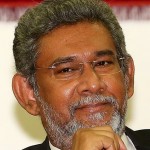A Brief Colonial History Of Ceylon(SriLanka)
Sri Lanka: One Island Two Nations
A Brief Colonial History Of Ceylon(SriLanka)
Sri Lanka: One Island Two Nations
(Full Story)
Search This Blog
Back to 500BC.
==========================
Thiranjala Weerasinghe sj.- One Island Two Nations
?????????????????????????????????????????????????Wednesday, May 28, 2014
The Return Of India: New Realities For The Govt & The TNA
By Dayan Jayatilleka -May 28, 2014
 Something
happened. Things just changed. Unnoticed by the Sri Lanka’s
cosmopolitan civil society intelligentsia which was engaged in “much
wailing and gnashing of teeth” (as the Bible has it), and “how many
angels can dance on a pinhead” type disputations (convoluted and
obfuscatory, with much lost in translation), the tectonic plates just
shifted.
Something
happened. Things just changed. Unnoticed by the Sri Lanka’s
cosmopolitan civil society intelligentsia which was engaged in “much
wailing and gnashing of teeth” (as the Bible has it), and “how many
angels can dance on a pinhead” type disputations (convoluted and
obfuscatory, with much lost in translation), the tectonic plates just
shifted.
The five post-war years were largely wasted because the South and North,
the Sinhalese and Tamil political elites represented by the Government
and the TNA adopted political postures that were exceedingly unrealistic but did not appear to
be so. The mutual and shared unrealism was possible because of one
factor and that factor has just changed; it no longer exists. Thus in an
overarching, parabolic, strategic sense the worst may be over, though
in a tactical sense things are bound to get worse, even much worse,
before they get better.
Mr Modi’s
investiture ceremony and the attendance of eight top level delegations
from the region restored South Asia’s status as a sub-system of the
world system. Every system or subsystem has a centre and a periphery. In
the second term of Dr Manmohan Singh,
India as the centre of the South Asian subsystem was deactivated;
almost dormant. To put it slightly differently, as a subsystem, South
Asia had a de-activated centre and therefore seemed de-centered.
It is in this context that actors on the periphery, including non-state
actors, operated with an anomalous degree of autochthony, going off the
charts, verging on soft anarchy. With Mr Modi, South Asia’s centre has
been reasserted.
During the interregnum that was the second term of Dr Manmohan Singh,
Sri Lankan ethno-politics were characterised by the following factors:
the Sri Lankan Government froze political dialogue with the Tamils. The
State proceeded on the basis of unilateralism. The Sinhalese tended to
make believe that they had beaten the Tamils, not just the Tigers. The
Southern hawks indulged in the fantasy of non-implementation of the 13thamendment.
During the same interregnum, the Tamils for their part proceeded to
make believe that the State hadn’t decisively won the war and that the
political project of Tamil nationalism could remain unaffected by that
outcome despite the fact that the Tamil political community had for the
most part backed the Tigers.

